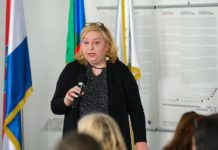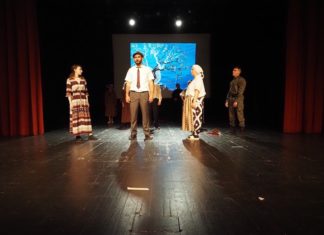Daut Qulangjiu is a longtime Roma activist, journalist, editor and radio and television director. He graduated from the Faculty of Mass Communication and Journalism in Pristina (Fakulteti i Komunikimit Masiv dhe Gazetaris- Universiteti AAB Prishtine). He was one of the promotors of the Romani language radio programmes that are still being broadcast on local radio stations and Radio Television of Kosovo. He participates in the work of the European Broadcasting Union within which a Roma Task Force Group was established in order to prepare projects aimed at developing media program about the Roma and for the Roma. He is a multi-annual participant of the International Symposium on Romani Language held in Zagreb from 3 to 5 November for ten years in a row. In 2017, he was presented the “Ferenc Sztojka” Lifetime Achievement Award for special merits in the field of preservation, standardization and development of the Romani language.
Given your journalistic experience how would you describe today’s state of the art in Kosovo media?
It is necessary to mention the influence of politics when talking about freedom of the media in Kosovo. Public media services, funded from the budget, are largely conditioned by political decisions. It is, however, different situation with the Roma editorial, we have never been censored. There is a difference between Romani radio and television programs. When we prepare the radio broadcasting program, freedom is greater, probably because the majority does not understand Romani language. On the other hand, when preparing television shows, there are greater constrains because they provoke more interest by the viewers due to movements and expressions of the participants.
When was the first program in Romani language broadcast and is it still broadcast today?
In 1986, we were first in the world to produce and broadcast a radio programme in Romani language. During the war in Kosovo we paused with the programme, and we continued the broadcasting in 2003. The show initially lasted only 20 minutes and was broadcasted once a week. I remember others telling us that we would not survive because the Roma community has no staff to edit the program and run the show, but we have persevered in order to have a chance to work on television along with the radio show. Back then, only three of us – editor, moderator and I as a journalist – edited the program. We always had more material than those 20 minutes we had for broadcasting so we insisted on a longer time. Today I can proudly say that we have one 45-minute radio programme broadcasting once a week on Radio Kosovo 1, and the other one-hour radio programme on Radio Kosovo 2. Additionally, we also prepare a one-hour radio show broadcasted daily. I would like to point out that we are the only radio in the world to broadcast 15-minute daily news in Romani language. News in Romani language is broadcast in Macedonia and Vojvodina as well, but not every day.
Multi-annual results prove that the activity of the Roma editorial office has continuously been increasing. In 2015 Radio Television of Kosovo proclaimed us the best newsroom on TV and we received a certificate. We broadcast our shows on social networks as well, and some have been viewed over 10,000 times. Possibility of reproduction and post-viewing enabled by social networks certainly command such large audience.
Are there enough positive stories about the Roma in the media? Do the media influence eradication of prejudice?
Shows on the Roma are full of prejudice, so it is important for the Roma themselves to gain education in journalism and prevent the material transmitted to convey a negative image. There are ten of us in the Radio Television of Kosovo and the shows we prepare are a good example. We are part of the European Broadcasting Union (EBU) that monitors public media services in 56 countries, within which the EBU Roma Task Force Group was organized. We have prepared a project aimed at teaching journalists about the Roma community helping them to interview the Roma and prepare reports about them. First we plan to train Roma journalists for trainers who would later teach other non-Roma journalists. The goal of this project is considered to be extremely important because of the fact that many journalists approach the Roma with prejudices and their stories spread a negative image.

How do you see the integration of the Roma into Kosovo society?
I would describe the integration of the Roma into Kosovo society as a long way, full of obstacles. The situation is now better than it was after the war, for example in 2002 and 2003, because international community is present in Kosovo controlling the adoption of legislation. There are seats in the Kosovan Parliament reserved for the Roma and in some other institutions as well, but this is not respected. The provision establishing 10% representation of the Roma population in public institutions has not been implemented. That is why we seek to work more intensively as a civil society. We seek only equality with other peoples, and this is also the desire of Roma communities in other countries. The situation is not better when it comes to the employment in private companies. According to the statistical reports, 60% of the total Kosovo population is unemployed, and if we take into account the Roma community, 99% of the Roma are unemployed.
What does the “Ferenc Sztojka” Lifetime Achievement Award represent to, the award you received on the occasion of the celebration of the International Romani Language Day, November 5, 2017?
I regularly come to Zagreb, among other things, to participate at the Symposium on Romani Language. With my colleagues from many European and world countries, I discuss important issues related to the Roma community. “Romani language and culture in emigration at the end of the 20th century” was the topic we discussed the last time. Conclusions that we come to at the end of the Symposium represent important guidelines for continuation of our work in our respective countries. I was proud to receive the “Ferenc Sztojka” Award for my work done so far within the media, but also related to the activism in the process of Roma integration in Kosovo through non-governmental organizations, as well as the participation in the realization of various projects. This Award will boost my motivation to continue working always striving to rescue Romani language from oblivion.












